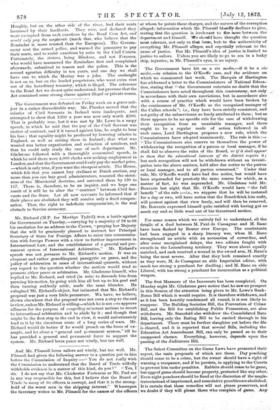The Government was defeated on Friday week on a grave
sub- ject in a rather discreditable way. Mr. Plunket moved that the salaries of Civil Servants in Ireland were inadequate, and attempted to show that £300 a year was now only worth £200. That is probably true, but it was met by Mr. Lowe in a raspy speech, in which he said that the pay of the Civil Servant was matter of contract, and if it turned against him, he ought to bear his loss ; that equality might be produced by lowering salaries in England, as well as raising them in Ireland ; that what was wanted was better organisation and reduction of numbers, and that he could only study the case of each department. Mr. Gladstone followed with a thoroughly economical speech, in which he said there were 4,000 clerks now seeking employment in London, and that the Government could only pay the market price, —which is only true, if you want the cheapest article. The House, which felt that you cannot buy civilians at Dutch auction, any more than you can buy good administrators, resented the strict- ness of the Ministerial doctrine, and outvoted them by 130 to 117. There is, therefore, to be an inquiry, and we hope one result of it will be to alter the " contract " between Civil Ser- vants and the State. Let all new servants be informed that if their places are abolished they will receive only a fixed compen- sation. That, the right to indefinite compensation, is the real obstacle to Service economy.


































 Previous page
Previous page